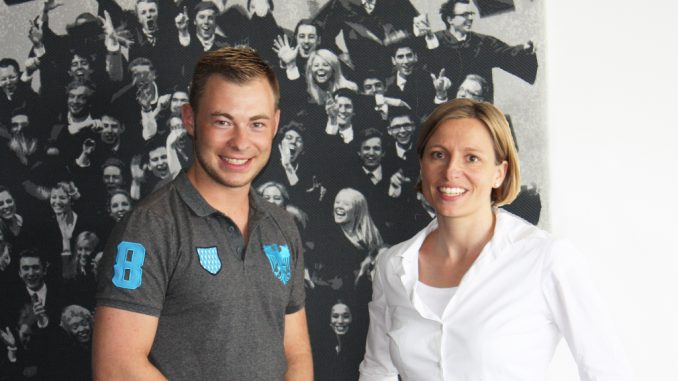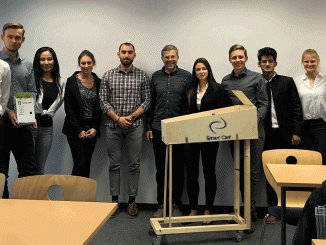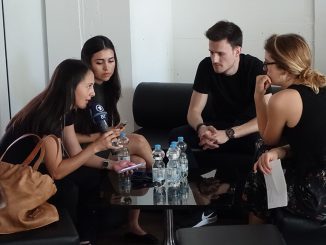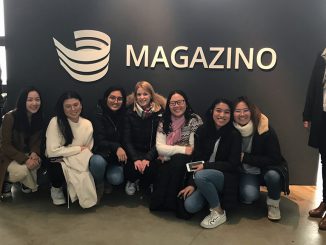
Over the course of our six-semester Bachelor program, we, the lecturers and teachers at MBS, have the opportunity to see how versatile our students are – and how favorably they are impacted in the course of the study term.
When they arrive, many of them are still insecure high-school graduates starting their studies in International Business with high motivation but little previous knowledge. When they later return to MBS from their semester abroad, they bring along a host of new and intercultural experiences from our international partner universities. At the end of their studies, they have evolved into qualified bachelor graduates who have accomplished a quantum leap with regard to personality and knowledge.
Jonas Reiner is one of those Bachelor students. He just passed his last exams and will soon have completed his studies. Shortly after the exam period, I met him for a short interview:
Patricia Kraft: Jonas, now you made it through all your exams. Only your final practical term and completing your Bachelor thesis is what’s missing for graduation. What kind of a feeling is that?
Jonas Reiner: I am indeed thrilled to have made it through all of this. Intense preparations for the tests and exams, the projects, presentations and case studies were often extremely time-consuming. But even though it often was strenuous, I am looking back to this eventful time with great joy about all that I was able to learn.
Patricia Kraft: Can you give us examples? What was particularly interesting or enriching?
Jonas Reiner: On the one hand, delving into all the theoretical groundwork, the various theories and models, was exciting. But I also liked the practical applications demonstrated in the courses, because that made things tangible.
The course on how to compile a business plan, for example, served me as an experimental project for my own start-up. I learned to outline a professional business plan and what details should be considered in particular. Another example of a practical application is the extracurricular support of my professor for economic law: Supporting me in obtaining a the word and figurative mark, he was always there to advise and guide me. In this context, I also want to refer to the information regarding start-up networks and business plan contests which I received from you. What also helped a lot were the process design methods that I had already come to use during my practical training term and that I am using now for my Bachelor thesis, too.
Patricia Kraft: You just mentioned the theories and models of the various subjects that you learned about during your studies? How do you benefit from such knowledge?
Jonas Reiner: In the beginning, we often tend to believe that models such as the PESTLE Analysis, the Ansoff Matrix or the Porter Analyses do not necessarily have any practical relevance. But the opposite is true: Exactly those models that seem simplistic at first help to structure complex matters and systematically consider and analyze all important aspects. That this is immensely productive became more obvious with each semester. Particularly in cases where the models were applied to specific case studies or even own concepts.
Patricia Kraft: Currently you are founding your own start-up with friends. Can you give us a few insights?
Jonas Reiner: Of course. We developed a concept for an app that we called Playzes. It is the first “location-based Shopping Game“. The idea behind it is to use the users’ real lives as basis for a duel-based mobile game.
And that’s how it works: Users feed the app with invoices of their purchases, which strengthens their in-game character. With this character, they can battle against the characters of other users. Additional functions such as geo-caching of weapons and items also make these characters stronger. At the same time, Playzes is a bonus card that is charged by loading invoices – which is rewarded with bonuses like free drinks etc. Thus, Playzes combines virtual and interactive fun with a real added value.
Patricia Kraft: How did you develop this idea?
Jonas Reiner: I developed the idea for Playzes during my semester abroad at National Taiwan Normal University in Taipei, which is one of MBS’s international partner universities. The people in Asia have a great affinity for technology and games. They always have a smartphone in their hands and with it, they handle almost their entire daily routines. When my friend Maximilian visited me in Taipei, we recognized this – and the idea for Playzes was born.
Together with Maximilian, who is studying software engineering, I continued developing the idea in September 2014. In the meantime four more friends and acquaintances had joined together to support us: a programmer of apps, a game designer and two marketing specialists, who, by the way, are both also MBS students.
Presently, we are working on the prototype for the app, on a business plan and the integration of the game concept.
Patricia Kraft: Has it been your goal to start your own business even before starting your studies?
Jonas Reiner: It’s true, I’ve always had a “entrepreneurial spirit”, but so far I never pursued any own project. Until present, I have not made up my mind if I want to become a self-employed entrepreneur with Playzes or if I want to move into a different direction.
Patricia Kraft: What other options are there on the table?
Jonas Reiner: I am very much interested in foreign cultures, above all in Asia. In addition to Spanish, I also learned Japanese and Chinese during my long years abroad. Therefore, I see cultural competence as my biggest strength. It has always been my dream profession to work in the diplomatic service. Maybe I will add a Master in International Relations or in International Finance to my Bachelor’s Degree. With my Bachelor, I am well-prepared for this.
Another option would be working on the consulting sector. In this context, I am mainly interested in the post-merger area. I will, however, not go deeper into software development, because I see my main competences in other areas. In addition to knowing your own strengths and competencies, you must also know what you don’t want to pursue any further.
Patricia Kraft: One last question, Jonas: What is your advice to a high-school graduate who will start his Bachelor program next fall?
Jonas Reiner: For me, at first, it was a bit overwhelming to see how comprehensive and versatile the MBS Bachelor Program is. My advice therefore is: In the first semesters, you should use the many upcoming occasions to find out what your own special interests and strengths are. I recommend specializing and getting in-depth competences in select areas only once this has been done.
Patricia Kraft: Thanks a lot for your time, Jonas, and all the best for your practical term and your Bachelor thesis!




